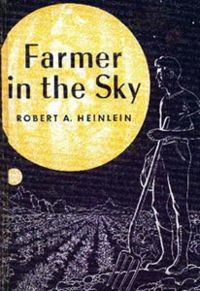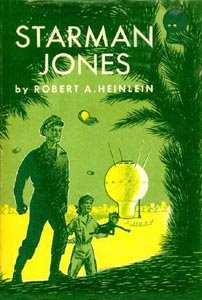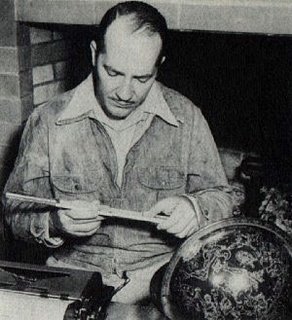We pray for one last landing
On the globe that gave us birth
Let us rest our eyes on the fleecy skies
and the cool, green hills of earth.
If you’ve read the words of the immortal Robert A. Heinlein, it’s likely that those words will bring a stirring to your spirit. Maybe they’ll remind you of your youth and all the hope, wonder and optimism that most of us know as youngsters.
My first favorite writer was Heinlein, and though I never met the man, I feel an enormous debt to him. I always considered Robert A. Heinlein to be my true father. I know that I learned far more from him than I did the man I was sired by. The most important things in life are conveyed in pointed and precise language in Heinlein’s books: Love, honor, duty, hope.
In those days, kids wanted to grow up to be astronauts, not some kind of geeky game designers. Well, I like to think that most of them did, but now that I look back with more clarity, it seems that the majority of the boys, the ones with less imagination, wanted to be sports professionals. But I dreamed of the stars. At least when I wasn’t shivering over monsters.
Some of the greatest reading memories of my life were with Mr. Heinlein’s books. I recall one time quite clearly. I suppose I was around eleven or twelve years of age:
My mother was not what you’d call a good cook. I thought that ‘home cooking’ was some kind of a joke and I much preferred packaged or frozen food. One of my favorites was Rice-a-Roni, as embarrassed as that makes me now. So that one day I had the house to myself and I was letting a luscious pan of The San Francisco Treat absorb its water and flavor pack and I was reading Farmer in the Sky. That twenty minutes or so seemed to take forever, because I was so hungry, but the book I was reading captivated me. I got so caught up in the exploits of young Bill Lermer and his pioneer family.
The story is fairly routine. Bill and his widowed father and brand-new wife decide to leave the overcrowded Earth and emigrate to Ganymede. For those that slept through their Science classes, Ganymede is one of the moons of Jupiter. Bill and his family embark on the spaceship which transports them to the fledgling colony on Ganymede. There they meet various hardships and discover the challenges of making a home and farm on the terraformed moon. But is nothing routine about Heinlein’s storytelling. It is captivating. Bill is a remarkable young man who faces his obsticles and becomes a man in the process. Tragedy strikes on more than one occasion, but Bill learns to love his new home.
Farmer in the Sky is one of Heinlein’s YA books, or as we called them back in the day, Juvenile Novels. These books may seem to be corny by jaded, quasi-intellectuals, but to individuals with some heart left in their chests, they are breathtaking and they represent that old sense of wonder more than any other books I’ve read. Period.
One especially poignant moment in Farmer in the Sky is when Bill tries to cheer up his family during the frigid dark phase Winter by banging out some songs on his accordian. When he plays The Green Hills of Earth, he realizes that it was the wrong time for such a nostalgic sentiment. Not during the long nights of seemingly endless cold.
My favorites of his work are the Juveniles and my favorites of the Juveniles are Farmer in the Sky and Starman Jones. I’ve lost count of how many times I’ve read these magnificent books and I’ll continue to revisit them until I die.
The Green Hills of Earth is one of the keynote pieces in Heinlein’s celebrated “Future History Stories”, most of which are assembled in his The Past Though Tomorrow collection. He documented an entire history of events that his fiction would chronicle, from the near (1950’s) present to the far flung future where humankind effortlessly traveled the cosmos. Simply put, science fiction gets no better than than Heinlein when he was on his game.
I remember one night in May 1988. I took the current issue of Time Magazine into the Reading Room for my evening constitutional. I read the terrible, unbelievable news and came out of the bathroom with tears in my eyes. My then-girlfriend looked startled and asked what was wrong. I choked out, “Heinlein died!“. She kind of said, “Oh”, like it was nothing. Nothing! It was like hearing that God died. To me, Robert Anson Heinlein was Lazarus Long and it didn’t make sense that he had died. It didn’t and it still doesn’t.

No comments